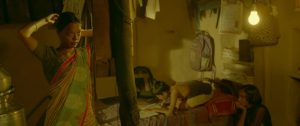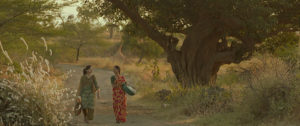
ECSA 2020 Short Film Review “U For Usha”
WATCH THE TRAILER HERE
First, the Recap:
Evident but hidden desire. This can apply to many different things in our lives, a powerful, sometimes all-consuming force that is so undeniable in its pull that resisting it can hurt just a much as what we are longing for. Yet, there is also those aforementioned thoughts, feelings, or yearnings that find unanticipated beginnings when we aren’t even looking for them, and this can draw us even more into the journey to seek out a means by which to explore and, ideally, experience it all. In the heart of rural India, a single mother and farm laborer named Usha (Kiran Khoje) strives and struggles to provide for herself and her two children. In desperation, certain choices are made and resented until she meets her children’s teacher, Manisha (Arpita Ghogardare), who has an unforeseen impact on Usha’s life.
Next, my Mind:
This 22-minute film, which constituted the third offering representing LGBTQIA+ programming at the 2020 ECSA: Escapist Cinema of South Asia online film festival presented by Jingo Media and sister festivals DFW SAFF and NYC SAFF, brought its message to light in what became a defining paradigm found in the shorts segment–artistically intelligent delicacy yet astutely precise poignancy with wholly relatable heart that transcended the primary themes, making it accessible to anyone, no matter what orientation viewers represented. That is quality filmmaking, and that was certainly on display here as well thanks to writer/director/producer Rohan Kanawade, producers Neeraj Churi, Karim Ladak, and Hareesh Reddypalli plus executive producer Narayan Swamy Subramani.
Utilizing a subtlety in execution paired with an underlying, simmering intensity of emotional soul that illustrates the narrative’s ultimate intent, it brought to mind a similar perspective and delivery found in the groundbreaking short film “Sisak“, where the picturing of desire and longing remained evident yet veiled to reflect the notions of how society at large views such inclinations. Now, it is also true that here, the pure innocense of genuine, unanticipated curiosity and building feelings is more what’s explored, replacing any envisioning of two people coming together in an atmosphere of hesitant apprehension with instead simple, giddy joy being discovered and birthed from loneliness, a needing to feel wanted and loved again.
In many respects, it’s a very refreshing viewpoint to ponder and take under consideration in a grander way that goes beyond just the LGBTQIA+-based purpose, because sadly, the twisted the notions about loneliness, the stigmas placed on it, and the craving to know what it is to be sincerely adored and cherished are all such applicable and apropos factors that need a voice in this world right now, showcased in a way that makes us realize we all experience these times and should never feel crippled by them, but rather have the means to find ways to overcome them with the right levels of encouragement and seeking as I felt were depicted here, as it can yield a happiness we’d perhaps never had noticed if not just being open to allowing it to come about.
Khoje embodies the role she plays with such a quietly fervent spirit and grounded sensibility in bringing Usha to life as the young, hard-working, yet broken woman she is. Usha’s labors to provide for herself and her family while having to sometimes endure, by choice, direct humiliation solely out of hopelessness or fundamental need, her world gets positively impacted upon meeting her children’s teacher Manisha, with whom she slowly but surely bonds with, initially as a mentor, but then beyond that, at least in her own mind. Even as she discreetly makes her attempts to gain like favor or interest, it’s so overtly faultless and demure that it endears us to her goal. Khoje is wonderfully vulnerable in the performance, very transparent and genuine, which solidifies the believability.
Ghogardare’s effort is quite a similar endeavor in understated-ness through her role as Manisha, the local village teacher who becomes more directly involved with Usha’s life when initially assisting in tutoring her children, which then turns into also assisting Usha herself to learn. She remains very open to Usha’s insistence of getting to know each other more socially and through education, but at first we might not get the idea that anything beyond that is remotely on the table. Yet, again, there becomes the minor yet emphatic indicators that there may indeed be something else stirring, but Manisha only shows it with muted reactions. It’s enough to feel confident of what’s being created between them, and a wholehearted tribute to Ghogardare’s beautiful performance throughout.
One additional supporting role mentioned comes courtesy of Hridaynath Jadhav as a local villager and motorcyclist who has more than just jeers and unwanted advances towards Usha. In total, “U For Usha” deftly expresses its LGBTQIA+ themes with the smartly conceived, totally engaging, heartfelt execution that reflects its concepts with admirable viability that assuredly makes it a story anyone can find meaning behind, again regardless of your orientation. It speaks to the humanity in us all, and that’s always what, for this critic, makes for ongoing praise towards the South Asian film community and its unflinching, uncompromising attitude towards telling such needed tales.
As always, this is all for your consideration and comment. Until next time, thank you for reading!






